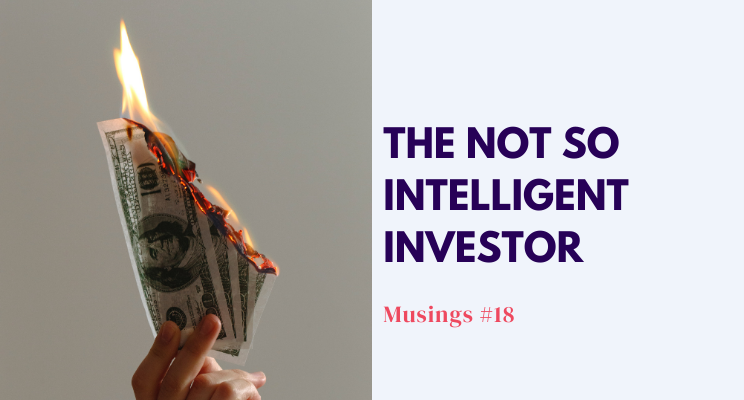“To invest successfully over a lifetime does not require a stratospheric IQ, unusual business insights, or inside information. What’s needed is a sound intellectual framework for making decisions and the ability to keep emotions from corroding that framework.” – Warren Buffett
Warren Buffett, arguably the greatest investor alive, makes it sound so obvious and straightforward. But investing is tough. I learned it the hard way as a 23-year old in 1998 with $10,000 (my sign-on bonus from Intel) in the US stock market in one of the most outrageous boom markets of all time – the dot com boom. While working a demanding job at Intel, many similar-aged friends and I used to do day trading from 1998 through 2001. Most of us sat on a net worth of 50-60 times of the amount we started with and felt like we were masters of the universe. But, to these set of people, all you need to say is the four letters JDSU – and you can watch our faces turning white – the following chart shows why.
JDSU was considered a “hot” stock in the networking space in the 1999-2000 time frame. We timed the market to perfection and bought it sometime in 1999. The stock went up 6 times in that time period (and split multiple times), and we caught it on the way up and felt really good. But, we clung on to this stock for way too long as the market crashed in 2001. At an astounding 15% annualized return, it would have taken us 30 years to make up the lost money – JDSU summarizes the story of this era of internet and networking stocks. This was despite most of us studying the markets closely and reading a bunch of investment guides, newsletters, etc. While we all thought we were intelligent investors in the stock market, we were not-so-intelligent speculators in reality.
“An investment operation is one which, upon thorough analysis, promises safety of principal and an adequate return. Operations not meeting these requirements are speculative.” – Intelligent Investor (published 1949)
In hindsight, I wish someone had forced us to read this one book, “The Intelligent Investor”, by Prof. Benjamin Graham (1894-1976). I have been studying this book, along with others about Buffett (90 years) and his business partner for over 50-years, Charlie Munger (95). There is a century’s worth of wisdom in these three men, and Buffett and Munger are as sharp today at this age as any of us could get over a lifetime. Prof. Graham taught Buffett at Columbia University, and this is what Buffett has to say about the book.
“I read the first edition of this book early in 1950 when I was nineteen. I thought then that it was by far the best book about investing ever written. I still think it is.”
This week and next, we will get to know these wise men a bit more and reflect on their lessons for us. Let’s start with Graham Value Investing basics that were introduced by The Intelligent Investor in 1950. Here are the core concepts.
Defensive vs. Enterprising investor
The best place to start is to figure out if we want to be a defensive investor or an enterprising investor. Prof. Graham defines a Defensive Investor as “one interested chiefly in safety plus freedom from bother.” If that is you, the very simple choice for such an investor is “to maintain a 50–50 proportion between stocks and bonds, with adjustments to restore the equality when market developments had disturbed it”.
On the other hand, if you want to be an enterprising investor, who wants to make above-average returns, here are the four basic tenets of Graham Value Investing. The quotes in this section (unless otherwise mentioned) are mostly from “Charlie Munger – The Complete Investor” by Tren Griffin. This useful book summarizes the critical aspects of Graham Value Investing and combines that with principles from Munger.
First Principle: Treat a Share of Stock as a Proportional Ownership of a Business
If you’re an investor, you’re looking on what the asset is going to do; if you’re a speculator, you’re commonly focusing on what the price of the object is going to do, and that’s not our game. —Warren Buffett
This is essentially what I did not do as a “not so intelligent investor” during the dot com days. Any time we buy equity, we have to treat it as a proportional ownership of that business. Over the years, I have learned to look at the various aspects of a business – idea, team, product, market dynamics, sustainable differentiation and moats, financing, etc. Without understanding all these aspects of the business, buying fractional ownership in the company would not be investing but speculation.
Second Principle: Buy at a Significant Discount to Intrinsic Value to Create a Margin of Safety
Confronted with a challenge to distill the secret of sound investment into three words, we venture the following motto, MARGIN OF SAFETY. — Ben Graham
This is the central tenet of Graham Value Investing. Based on business fundamentals, figure out the true value of an asset and buy it at a price that provides a good margin of safety over that price. This requires doing all the hard work necessary to figure out an asset’s true value and having the patience to wait and buy it only when the price is right. Easier said than done.
No matter how wonderful [a business] is, it’s not worth an infinite price. We have to have a price that makes sense and gives a margin of safety considering the normal vicissitudes of life. — Charlie Munger
Third Principle: Make “Mr. Market” Your Servant Rather Than Your Master
“Imagine that in some private business you own a small share that cost you $1,000. One of your partners, named Mr. Market, is very obliging indeed. Every day he tells you what he thinks your interest is worth and furthermore offers either to buy you out or to sell you an additional interest on that basis. Sometimes his idea of value appears plausible and justified by business developments and prospects as you know them. Often, on the other hand, Mr. Market lets his enthusiasm or his fears run away with him, and the value he proposes seems to you a little short of silly.”
– Ben Graham, The Intelligent Investor
This is an excellent explanation of Mr. Market. Whatever type of investing we are doing, there is a Mr. Market out there who is always tempting us. The key is to not fall under the sway but to stick to our guns on what we believe is the business’s intrinsic value and buying from Mr. Market only when the pricing is right. When it comes to selling, holding on to a stock irrespective of its price as long as we understand its true worth and selling only when we believe the price is right.
Falling in with the crowd will put you under the sway of Mr. Market because Mr. Market is the crowd. If you are the crowd, then you cannot, by definition, beat the crowd.
Fourth Principle: Be Rational, Objective, and Dispassionate
While Graham value investors do not try to predict the behavior of other people, they do spend a lot of time trying to keep their own behavior from getting in the way of being rational, objective, and dispassionate.
This is probably the toughest one to follow and what probably sets apart the truly great investors from the rest. Definitely true for Buffett and Munger.
“It’s remarkable how much long-term advantage people like us have gotten by trying to be consistently not stupid, instead of trying to be very intelligent. There must be some wisdom in the folk saying, “It’s the strong swimmers who drown.” – Munger
To Ponder
For any significant equity we own (private or public), try applying the Principles above and ask, “If I were to buy this stock today, will I do it?”
Highlights
A few books that give a great window into Buffett and Munger that I would highly recommend:
- “Snowball: Warren Buffett and the Business of Life” and “Buffett: The Making of an American Capitalist” – both give a great window into Warren Buffett.
- “Poor Charlie’s Almanack” is probably the best book on Charlie Munger.
- And I also recommend reading the Shareholder Letters from Berkshire Hathaway. If you want an abridged version of this, “The Essays of Warren Buffett” organizes the core concepts of these letters in a very accessible way.
Spotlight
Here is a short video summarizing some of Munger’s rules for success for those of us who have not seen him in action.
Hope we get to reflect on what kind of an investor we would like to be and how we can continue developing our skills in this area. If there are specific books that really helped you along in the journey, would love to hear from you in the comments. That is all for today. Stay Safe!
(If you are enjoying Musings and find it helpful, please subscribe, and please share with friends who might find it useful.)




